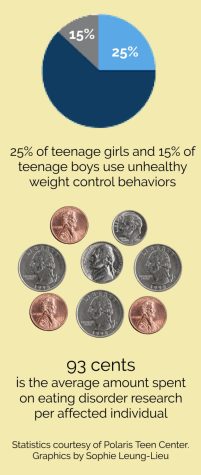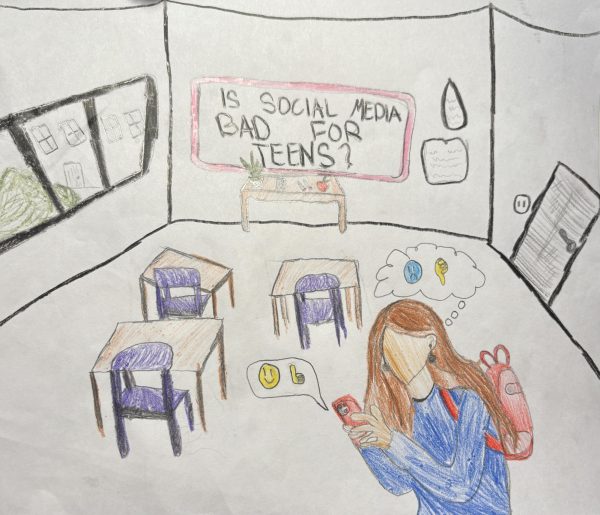Breaking the silence
Why eating disorders aren’t talked about enough in the education system
According to the July 2022 article, “College Students and Eating Disorders” published on the Child Mind Institute website, 10-20% of women and 4-10% of men struggle with an eating disorder during college.
TRIGGER WARNING:
DISCUSSION OF EATING DISORDERS.
I remember sitting in my seventh-grade classroom learning about eating disorders, but then only being described the most extreme cases. In my head an eating disorder was when young skinny women refused to eat until they were skin and bones. I didn’t think anyone I knew could have such a disorder. Another shortcoming of the lesson was its gendering of the issue, perpetuating the misconception that eating disorders are an issue that only affects girls. What about the thousands of young boys who look up to different celebrities, athletes and models thinking, “I need to look like this.” Did we just forget about them? Or did we not realize that young boys were also affected by this issue?
—Leah Gordon
The Texas health curriculum fails to properly educate students on eating disorders, leading to detrimental, one-sided perspectives that represent these issues as gendered and invalid.
Although many students are aware of our health curriculum’s failures, they might not realize the detrimental effects caused by this miseducation. According to a 2007 study published in the journal of Biological Psychiatry, 0.9% of women and 0.3% of men struggle with anorexia during their lifetime. That does not include any other forms of eating disorders, such as bulimia and binge eating disorders that are just as serious. The study also states that most of these disorders develop before the age of 21.

Topics like eating disorders are typically not prioritized in the curriculum because they can be such a touchy topic. When a sore subject like this is brought up, oftentimes it is brushed over, acknowledged but not addressed head on. This is in part due to the sensitive nature of the topic. This leaves a lot of room for kids to find that information in other ways like through peers or social media, which often isn’t reliable. Because eating disorders are also mental-health issues, they can be a difficult subject to explore for this reason as well.
Children and young adults these days are being trained not to speak up about their mental issues for fear of being invalidated. We strongly believe it is important to know that you’re not the only one suffering from a disorder that affects others and that it is fully appropriate to talk about it even if you are unsure and could just be confused. By not speaking up out of fear, young kids and teenagers don’t see the long-term effects.
An eating disorder can start out small, but as they go untreated, the eating disorder can become uncontrollable and unstoppable.
There is a lot of shame around the topic of eating disorders, but it is a medical disorder and not something that is easily controlled. As high school students, we are bridging a time of independence, so it is vital that we learn the skill of taking advantage of the support system around us, even if that means having to be vulnerable. According to the July 2022 article, “College Students and Eating Disorders” published on the Child Mind Institute website, 10-20% of women and 4-10% of men struggle with an eating disorder during college. The stress of school work and a new social environment evidently creates the perfect storm.
Without a good education on the subject, these rates are going to continue to rise and more and more people are going to struggle with little knowledge of what to do or how to ask for help. Because a larger number of women battle with these issues, there is a stigma around boys that may be dealing with the same issues.
Eating disorders aren’t just starving yourself until you need to be hospitalized. That is an extreme case of one, but they can root from little things like hyper fixation on your weight and what you eat. That is a universal problem, not just an extreme one, and it’s time that the conversation about it reflected how widespread the issue is.






















